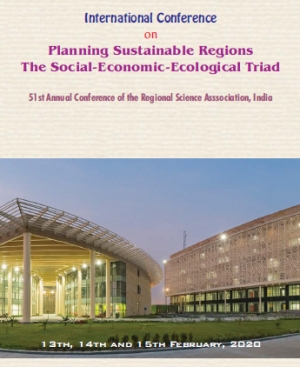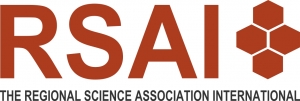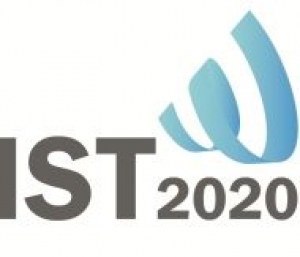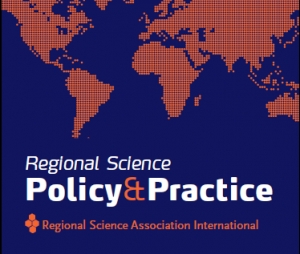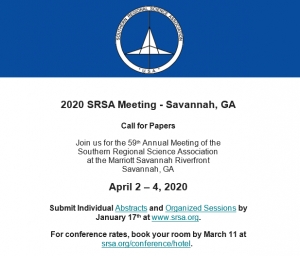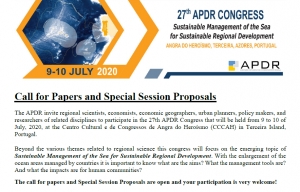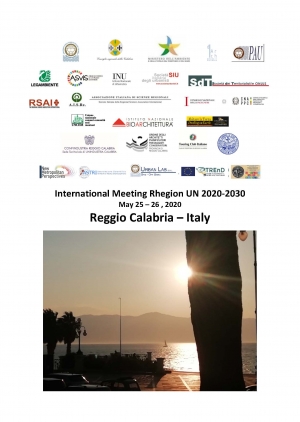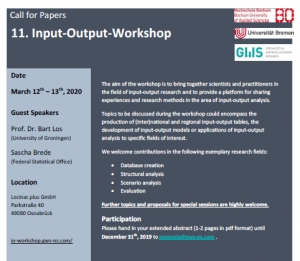Council
Elisabete Martins
51st RSAIndia Conference | 13-15 February, 2020, Kolkata, India (Final Circular)
We are pleased to announce the upcoming 51st annual conference of the Regional Science Association, India. The Amity Institute of Environmental Sciences and Amity Institute of Social Sciences of Amity University, Kolkata, India is going to organize an international conference on Planning Sustainable Regions: The Social-Economic-Ecological Triad during February 13-15, 2020. Kindly find the attached final circular of the conference.
Candidatures for the 2020 Hirotada Kohno award
Dear RSAI members,
I am writing you to kindly elicit your candidatures for the 2020 Hirotada Kohno award.
As you may know, this is an important prize in regional science bestowed on people who proved outstanding service to our global community. While I am reporting the rules of the award below for your covenience, it suffices to remind you that all of you can propose candidatures that need to be supported by an official letter by the President and/or Secretary and/or Executive Officer of an official body within RSAI - that is, the RSAI itself; NARSC, ERSA, PRSCO; or a Section of RSAI.
You can find additional details on the award here:
http://regionalscience.org/index.php/awards/hirotada-kohno-award.html
Lastly, I would kindly ask you to submit your candidatures within Jan. 31, 2020 at the latest. A selection committee appointed by the RSAI Council will choose the winner who will ideally be awarded at the world conrgess in Marrakech, June 2-5, 2020 (where I expect to see many of you in person).
Thank you so much in advance for your cooperation,
Kind regards,
Andrea Caragliu
Executive Director, Regional Science Association International
Associate Professor of Regional and Urban Economics
Politecnico di Milano
ABC Department
Piazza Leonardo da Vinci, 32
20133 Milan (MI)
Italy
3.1 In the last quarter of each calendar year, the RSAI Executive Director will contact the RSAI Council, the Councils/Boards of NARSC, ERSA and PRSCO, and the Councils/Boards of all affiliated RSAI Sections, calling for written nominations of potential candidates for the Hirotada Kohno Award for Outstanding Service to the RSAI.
3.2 A nomination of a candidate for consideration for the Award must be made in writing by the President and/or Secretary and/or Executive Officer of an official body within RSAI - that is, the RSAI itself; NARSC, ERSA, PRSCO; or a Section of RSAI.
3.3 A written nomination of a candidate for consideration for the Award must include a detailed statement of the nature of the service contribution a candidate has made to RSAI. It must explain how and why that service contribution of the nominee meets the goal of the Award. It should contain testimonials from at least three persons who have held high office and/or currently hold high office in the organization within RSAI that is making the nomination. It must be demonstrated that the long and outstanding service of the nominee extends beyond the local Section of RSAI in the case where a Section of RSAI is initiating the nomination.
3.4 Nominations for the Award are to close by the end of January the following calendar year.
Call for submissions - IST2020 Conference
We are pleased to invite you to the 11th International Sustainability Transitions Conference (IST2020), which will take place in Vienna, Austria, from 18th to 21st August 2020. It will be co-hosted by AIT Austrian Institute of Technology, Center for Innovation Systems & Policy and Vienna University of Economics and Business (WU Wien), Institute for Law and Governance/Research Institute for Urban Management and Governance, in association with the Sustainable Transition Research Network (STRN). The main topic of the 2020 conference is “Governance in an Era of Change – Making Sustainability Transitions Happen”.
Submissions for papers and sessions are open until 31st January 2020: http://ist2020.at/call-for-submission/
We are looking forward to meeting you in summer in Vienna!
Best regards and many thanks,
Gudrun Haindlmaier on behalf of the IST2020 local organizing team
RSPP Call for Paper | Special Issue on The underlying factors of (recent) regional voting patterns (NEW DEADLINE)
The underlying factors of (recent) regional voting patterns
Explaining spatial patterns of voting behaviour is a very recent and rapidly growing field of research in regional science. Since the rise of more right-wing and/or protest voting, it has become apparent that these votes are not randomly spread over space. An interesting example is the spatial distribution of votes in favour of the Brexit. Most people who voted to leave the EU were located in the middle-east regions of England while the people who preferred to remain in the EU mostly lived in and around London. These voting patterns coincide with geographical patterns of education level; income level and dependence on the manufacturing sector (Becker et al., 2017). Recently, Andres Rodríguez-Pose connected this voting behaviour to a feeling of discontent that is increasing in certain regions and he labelled recent ballot outcomes across the EU as ‘The revenge of the places that don’t matter (2018).
In this special issue, the focus is on underlying factors of regional voting patterns. The territory contains many variables that can help us understand voters' voices about the single currency, migration, budgets, environment, education, health, taxes, life and peace. Can we link voting patterns to discontent, and if so, what is causing this feeling of discontent? Do voting patterns on various topics differ between regions and countries, between urban- and rural regions, and between regions that grow or are in decline? What about space-time patterns? We in particular welcome submissions that focus on causality.
Planning
- Full paper submission February 1st 2020
- Reviews February 2020
- Final paper submission May 2020
Editors: Prof. Eveline van Leeuwen (This email address is being protected from spambots. You need JavaScript enabled to view it.) & Dr. Solmaria Halleck-Vega (This email address is being protected from spambots. You need JavaScript enabled to view it.), Urban Economics group, Wageningen University
References
Becker, S. O., Fetzer, T., & Novy, D. (2017). Who voted for Brexit? A comprehensive district-level analysis. Economic Policy, 32(92), 601-650.
Rodríguez-Pose, A. (2018). The revenge of the places that don’t matter (and what to do about it). Cambridge Journal of Regions, Economy and Society, 11(1), 189-209.
3-year postdoc positions in Circular Food Systems and Consumer Food preferences in Wageningen, the Netherlands
Are you a talented and enthusiastic Urban/regional economist/geographer, environmental economist and/or behavioral economist? Are you a team-player appreciating collaborating with a larger group of post-docs based in different social sciences groups to generate innovative and unexpected insights that will really make a difference to a better world?
The Urban Economics group at Wageningen University is looking for 2 post-doc researchers (3-year position). One focusing on ‘The role of cities in circular food systems’ (project 1) and one on ‘Consumer preferences for food choices across different dimensions: health, environmental outcomes, location of damages’ (project 8).
For more information, please contact Prof. Eveline van Leeuwen (This email address is being protected from spambots. You need JavaScript enabled to view it.). Submission deadline is January 19th 2020.
https://www.wur.nl/en/article/We-are-looking-for-15-Postdocs-in-social-sciences.htm
Call for Papers | 2020 SRSA Meeting - Savannah, GA, April 2 – 4, 2020
|
Call for Papers and Special Session Proposals | 27th APDR Congress | 9-10 July 2020, Angra do Heroísmo, Portugal
Call for Papers and Special Session Proposals
The APDR invite regional scientists, economists, economic geographers, urban planners, policy makers, and researchers of related disciplines to participate in the 27th APDR Congress that will be held from 9 to 10 of July, 2020, at the Centro Cultural e de Congressos de Angra do Heroísmo (CCCAH) in Terceira Island, Portugal.
Beyond the various themes related to regional science this congress will focus on the emerging topic of Sustainable Management of the Sea for Sustainable Regional Development. With the enlargement of the ocean areas managed by countries it is important to know what are the aims? What the management tools are? And what the impacts are for human communities?
The call for papers and Special Session Proposals are open and your participation is very welcome!
Themes of specific interest are:
- RS01 - Sustainable Management of the Sea for Sustainable Regional Development
- RS02 - New Urban Agenda and Sustainable Development Goals
- RS03 - Circular Economy at Regional, National and International Level
- RS04 - Migration, Integration, Growth and Welfare
- RS05 - Social, Economic and Environmental spatialized impacts of tourism and sports
- RS06 - Spatial Aspects of the Green Deal
- RS07 - Climate change mitigation and adaptation
- RS08 - Spatial Allocation of Public Goods and Services
- RS09 - Regional resilience and crisis
- RS10 - Low-density regions and development
- RS11 - Big and Available Data for regional science
- RS12 - Geographic Information Systems and location modelling
- RS13 - Systemic Analysis of Transport and Communication Networks
- RS14 - Methodological approaches to Innovation and Entrepreneurship
- RS15 - Operational Models for Cities and Regions
- RS16 - Qualitative analysis of spatial interaction within space
- RS17 - Spatial econometrics
- RS18 - Ecological Economic Approaches and Methods
- RS19 - Tools to analyse, evaluate and Manage Ecosystem Services
- RS20 - Urban design and city competitiveness and sustainability
Deadline for Special Session proposals: February 29, 2020. Proposals should be sent by email to the secretariat of the Congress (This email address is being protected from spambots. You need JavaScript enabled to view it.).
Deadline for Abstracts submissions: March 30, 2020. Authors should submit their abstracts through online submission system by following the link https://cmt3.research.microsoft.com/APDR2020.
All information at the congress website: http://www.apdr.pt/congresso/2020
Looking forward to meeting you in Angra do Heroísmo!
The Organizing Committee and the Board of APDR
27th APDR Congress
Calls for papers | International Meeting Rhegion UN 2020-2030, May 25 – 26 , 2020, and Workshop/Competition Rhegion UN 2020 -2030, June 1 - 5, 2020, Reggio Calabria – Italy
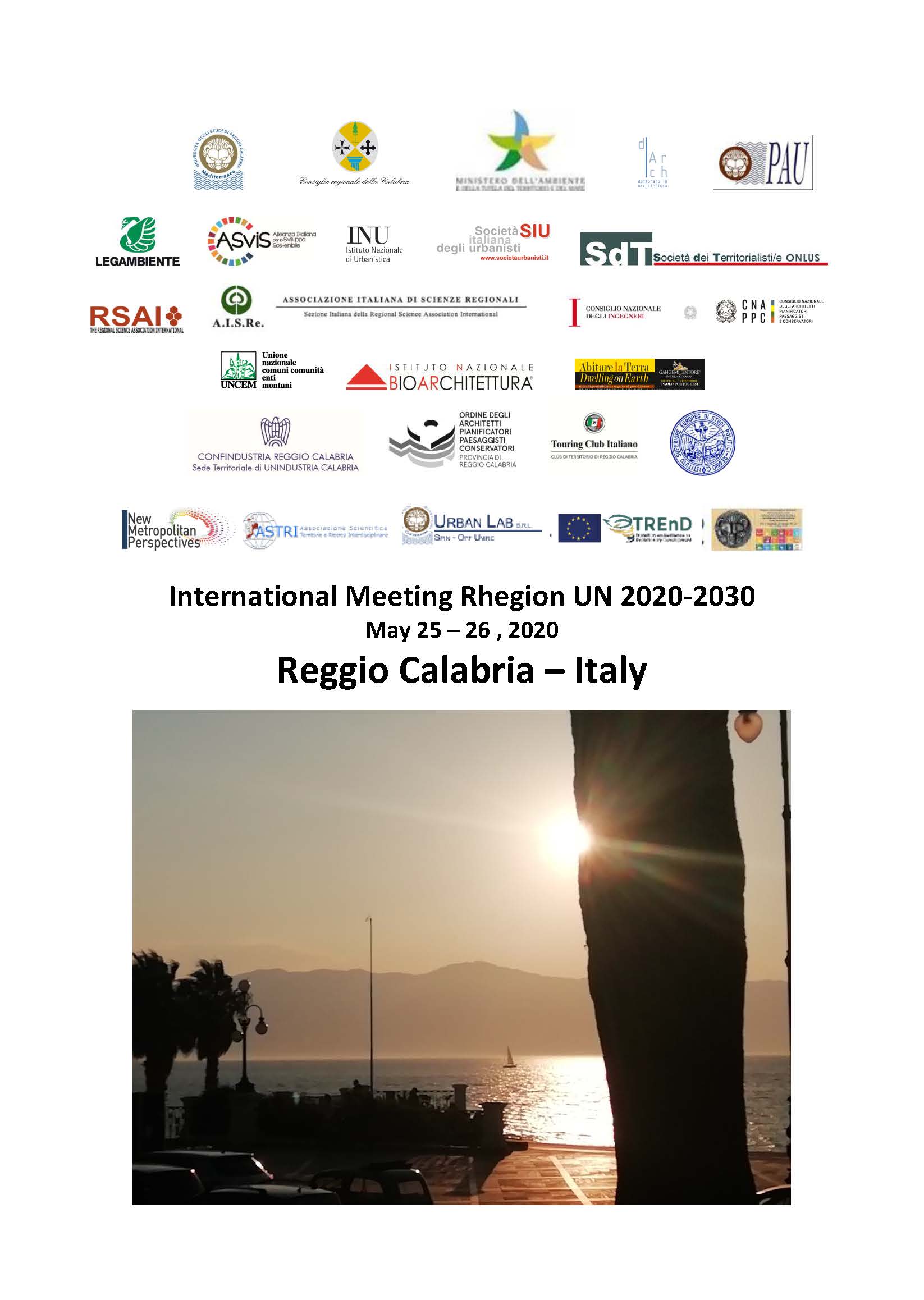 Dear all,
Dear all,
the Call is open - deadline January 15th - to send papers to Rhegion UN 2020 - 2030.
Because Rhegion is partner of New Metropolitan Perspectives Simposium and for reasons of publication, the Call follows the procedure of New Metropolitan Perspectives - registration, upload of the paper and then, after peer review, publication with Springer Editor- specifying that the paper is for Rhegion and making a choice priority among the 5 thematic areas (as proposed in the draft of the Program that will be defined in the next months):
1 - History and Nature draw the Landscape
Chair: Heritage, Architecture and Urban Planning Department - PAU
2 - Environmental Resources, Sustainability, Technology
Chair: Civil Engineering, Energy, Environment and Materials Department - DICEAM, and Department of Information Engineering, Infrastructures and Sustainable Energy - DIIES
3 - The Forms of Sustainability
Chair: Architecture and Territory Department - dArTe
4 - Nature Resources and Anthropic Processes
Chair: Agricultural Department, Agriculture, Forestry, Environment, Food - Agraria
5 - Ethics, Aestetich, and Rights of Environment
Chair: Department of Law, Economics and Human Sciences - DiGiES
Each will be managed by a department of the University, having incorporated the two Engineering departments, which, however, if they are available, a further session can be created.
The links for it are
http://www.nmp.unirc.it/wp-content/uploads/2019/12/TS-25.pdf
http://www.nmp.unirc.it/edition-2020/
The link for the Workshop Call is
http://www.nmp.unirc.it/wp-content/uploads/2019/12/Workshop-Call.pdf
A few months before the Event, a phase of diffusion in the city schools of the topics covered is foreseen.
Furthermore, the recognition of CFU for students will be required and, with the involvement of professional associations, of professional ones.
The Italian Ministry of the Environment for the protection of the territory and the sea, prof. Mark Catridge - President of the International Regional Science Association, prof. Andrè Torre - President of the European Regional Association, Vincent Kitio - Arch, PhD. | Chief, Urban Energy Unit |Urban Basic Services Branch | United Nations Human Settlements Programme, UN-Habitat | Nairobi, Kenya, Wang Xin - Doctor, Vice Dean, Associate Professor - TONGJI Institute of Environment for Sustainable Development, (IESD), MOE Joint Lab for International Cooperation on Eco-Urban Design, College of Architecture and Urban Planning, Tongji University, Shanghai, China, Legambiente, the National Council of Engineers - CNI, and the National Council of Architects, Planners, Landscapers, Conservators - CNAPPC, already have confirmed their presence.
Emeritus prof Federico Butera of the Polytechnic of Milano will participate.
And the two days of Rhegion Event, May 25 -26 and the Workshop, June 1-5, will probably be included among the events of the Sustainable Development Festival promoted by ASviS - of which we have patronage and participation - that takes place from May 20 to June 5, 2020, throughout Italy.
We are awaiting confirmation of Jeremy Rifkin. It is possible that the urban sociologist Saskia Sassen will also participate.
Rhegion United Nations 2020-2030: Territories And Cities, Material And Immaterial Heritage, Resilience And Ttransformation in the perspective of the 17 UN Sustainable Development Goals to change the world" is promoted by the Mediterranea University of Reggio Calabria, Department Heritage, Architecture, Urban Planning - PAU, the International PhD Programme in Architecture of the University Mediterranea of Reggio Calabria, with the participation of New Metropolitan Perspectives and TREnD Project, the patronage of Ministry of the Environment and Protection of the Territory and the Sea - MATTM, National Union of Municipalities and Community of Mountain Authorities - UNCEM, Regional Science Association International - RSAI, International Society of City and Regional Planners - ISOCARP, National Institute of Urban Planning - INU, Society of Italian Townplanners - SIU, Society of Territorialists - SdT, Italian Regional Science Association - AISRe, Legambiente, Italian Alliance for Sustainable Development - ASviS, National Council of Engineers - CNI, National Council of Architects, Planners, Landscapers, Conservationists - CNAPPC, National Institute of Bio-architecture - INBAr, Dwelling on Earth - Abitare La Terra, Aldo Della Rocca Foundation, Research Center for the Aesthetics of Law - CRED, European Higher Institute of Political Studies - ISESP, Research Team for Mediterranean Entrepreneurship and Startups - RETMES,Order of Architects, Planners, Landscapers, Conservationists of Reggio Calabria Province, Confindustria Reggio Calabria, Touring Club Reggio Calabria.
We are waiting for the patronage of the European Regional Science Association - ERSA and other international as well as national bodies.
This initiative intends to propose Reggio Calabria as a cultural, scientific and operational reference, on a large scale, for the subjects covered by the UN 2020 - 2030 Agenda.
PS The Workshop Call is "in progress" due to the addition of the patronages that are continuing to arrive as well as that of Rhegion. The International Society of City and Regional Planners - ISOCARP and the Higher Institute for the Protection and Environmental Research - ISPRA are about to give their patronage and will partecipate in the works.
Thank You very much.
For more information contact This email address is being protected from spambots. You need JavaScript enabled to view it.
Best regards.
Stefano Aragona
Master of Science in the Economy & Policy Planning
Department of Heritage, Architecture, Urban Planning
University Mediterranea of Reggio Calabria
Salita Melissari
89124 Reggio Calabria - Italy
Tel. +39 0965.1696402
Mobile 320.2347796
Reminder I-O-Workshop Germany, Osnabrück
****** REMINDER CALL FOR PAPER ******
Please be reminded for abstract submission for the 11th Input-Output Workshop in Germany, Osnabrück.
The date of the Workshop has changed to March 12th – 13th 2020.
Deadline for submission is December 31st, 2019.
Participants without abstracts are also welcome.
Please send your abstract and /or your interest in participation by Email to Anke Mönnig (This email address is being protected from spambots. You need JavaScript enabled to view it.).
Season greetings and happy New Year!
Yours
Anke Mönnig
Winner 2019 of Czamanski Dissertation Award
Haotian Zhong is the 2019 Czamanski Dissertation Award for his dissertation entitled "Autonomous vehicles and urban form". He was supervised by Wei Li from Texas A&M University.
Congratulations!
About Us
The Regional Science Association International (RSAI), founded in 1954, is an international community of scholars interested in the regional impacts of national or global processes of economic and social change.

